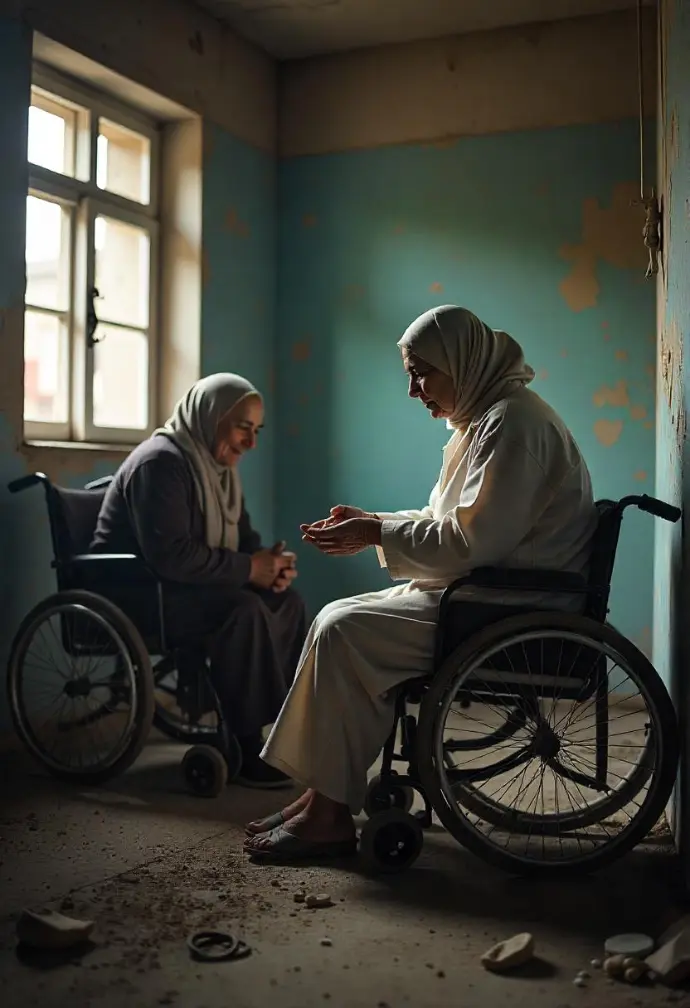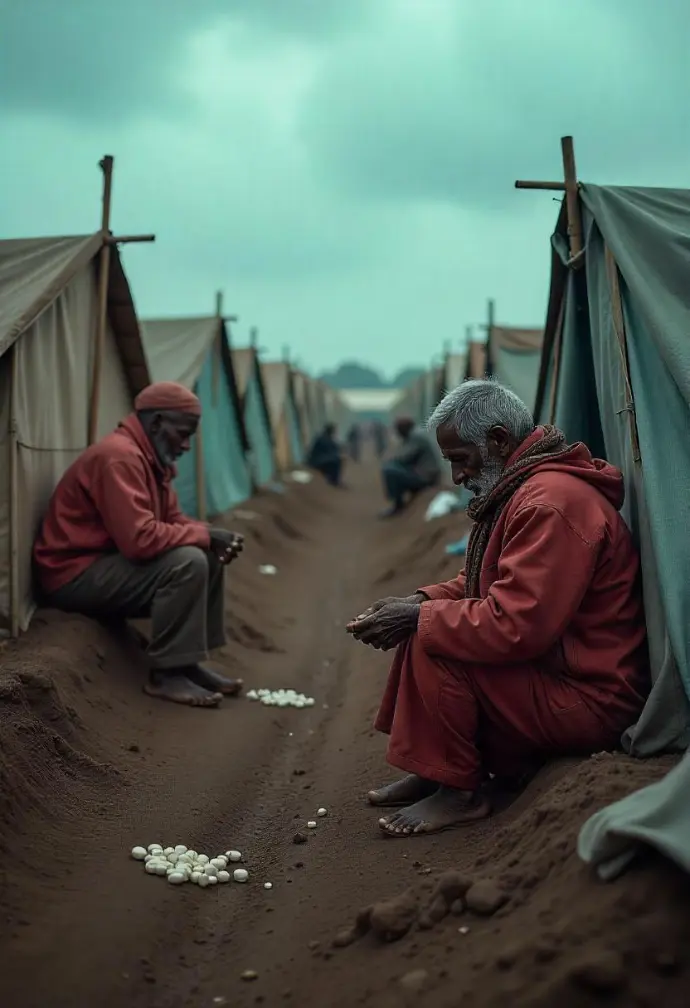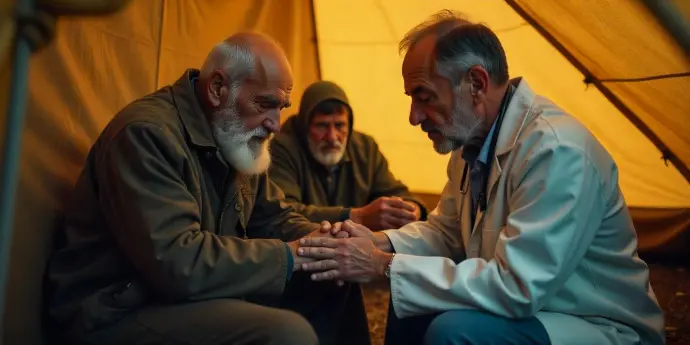Forgotten Elderly: Access to Healthcare for Seniors in War Zones
On our website, you'll find a comprehensive analysis of the challenges facing older adults in conflict zones, particularly access to healthcare. Dive into our feature article, "Forgotten Elderly: Access to Healthcare for the Elderly in War Zones," and discover how the vulnerability of this population is affected by the context of war. We invite you to explore this fascinating topic and join the conversation on global human rights.



Introduction
We will explore the impact of armed conflict on the health of the elderly, the importance of access to healthcare for the elderly in war zones, and the specific challenges in providing healthcare to the elderly in armed conflict settings.
Armed conflict has a devastating impact on the health of the general population, and the elderly are no exception. Lack of access to food, clean water, medicines, and quality medical care puts the health and well-being of the elderly in these situations at risk. Furthermore, exposure to violence and forced displacement can cause physical and psychological trauma in this vulnerable population.
The lack of adequate medical infrastructure and the destruction of hospitals and health centers during conflicts further hinder older adults' access to necessary medical care. This combination of factors means that older adults in war zones face a significantly higher risk of illness, disability, and mortality.
Understanding the direct impact that armed conflict has on the health of the elderly is critical to effectively addressing this humanitarian crisis.
Access to healthcare for the elderly in war zones is crucial to ensuring that older adults receive the medical care necessary to maintain their health and well-being. Since the elderly population tends to have greater healthcare needs due to chronic health conditions and physical frailty, access to medications, treatments, and specialized care is critical.
Furthermore, access to healthcare not only refers to direct medical care, but also to the availability of resources such as nutritious food, clean water, and safe living conditions that influence the overall health of older adults. In contexts of armed conflict, the provision of these resources is critical to protecting the health and well-being of older adults.
Ensuring access to healthcare for older adults in war zones is a humanitarian and ethical responsibility that requires the attention and action of the international community, humanitarian organizations, and governments involved in conflicts.
Specific challenges in healthcare for the elderly in armed conflict settings include a shortage of trained medical personnel and a lack of basic medical supplies. Disruption of continuous health services and limited access to safe medical facilities further exacerbate the situation.
Furthermore, older adults may face difficulties in accessing healthcare facilities, limiting their ability to receive timely medical treatment and care. This limited mobility can exacerbate chronic health conditions and increase older adults' vulnerability to infectious diseases and injuries.
Protecting the health of older adults in armed conflict settings requires specific approaches that address these challenges, including creating safe routes to access healthcare, supporting caregivers and family members, and providing medical services tailored to the needs of older adults.
Current Situation of Healthcare Access for Older Adults in War Zones
In war zones, access to medical resources and care for the elderly is extremely limited. The lack of medical infrastructure, coupled with a shortage of supplies and trained personnel, makes it extremely difficult to provide adequate health care for the elderly. In many cases, health care facilities have been severely affected by the conflict, further reducing the availability of services for this vulnerable population. This precarious situation leads to a significant increase in untreated and exacerbated illnesses, as well as a decreased quality of life for the elderly in these areas.
Humanitarian aid programs and non-governmental organizations play a crucial role in providing medical resources and assistance in these regions. However, they often face significant challenges in their work, such as insecurity, lack of access, and limited funding, which limit their ability to fully address the health care needs of the elderly population.
Greater collaboration and coordination between humanitarian actors, local governments, and international organizations is critical to ensure that medical resources and care are available to older adults in war zones.
Logistical and security challenges represent significant barriers to providing health care to older adults in war zones. Instability and armed conflict hamper the transportation of medical supplies, the deployment of medical personnel, and access to affected communities. Furthermore, the presence of landmines, unexploded ordnance, and other conflict-related hazards can jeopardize the safety of both older adults and medical personnel attempting to provide care.
The lack of adequate infrastructure, such as passable roads and safe health centers, further exacerbates these logistical challenges. Humanitarian organizations are often forced to develop creative strategies to overcome these limitations, such as the use of protected medical convoys, the implementation of mobile clinics, and collaboration with local actors to ensure the safety of staff and patients.
Furthermore, coordination with parties to the conflict is essential to ensure that medical facilities and medical personnel are respected and protected during armed conflict, in accordance with international humanitarian law.
The psychological and emotional impact on the elderly in war zones is profound and widespread. Exposure to violence, the loss of loved ones, the destruction of homes, and the lack of security have a devastating effect on the mental and emotional health of the elderly. Many experience high levels of stress, anxiety, depression, and post-traumatic stress disorder due to the traumatic conditions they face.
Lack of access to specialized mental health services further exacerbates this crisis. The stigmatization of mental health issues, the shortage of trained professionals, and the prioritization of emergency medical care over mental health care contribute to the fact that the elderly in war zones face a significant lack of psychological support.
It is essential that humanitarian aid programs integrate psychosocial support and mental health care into their interventions, recognizing the importance of addressing the emotional and psychological needs of older adults affected by armed conflict.
Given the dire situation of access to healthcare for the elderly in war zones, it is crucial to implement effective humanitarian aid solutions and programs. One possible solution is the establishment of humanitarian corridors that allow safe access of medical supplies and specialized personnel to the affected areas. These corridors would facilitate the delivery of medicines, medical equipment, and the provision of healthcare services to the elderly caught in armed conflict.
Furthermore, it is essential to promote collaboration between humanitarian organizations, governments, and international actors to ensure the protection and care of the elderly population in conflict zones. The coordination of efforts and resources is essential to ensure that the elderly receive the necessary medical care, as well as the psychosocial support required in war situations.
Furthermore, the implementation of humanitarian aid programs specifically targeted at the elderly population in war zones is essential. These programs must include the provision of nutritious food, clean water, safe shelter, and specialized medical care. Furthermore, it is crucial to provide emotional and social support to the elderly, recognizing their vulnerability and respecting their dignity amid extremely difficult circumstances.
Legal and human rights aspects related to access to health care for the elderly in conflict zones
In the context of armed conflict, older persons are one of the most vulnerable populations and at greatest risk of suffering human rights violations, including access to healthcare. In this regard, various international standards seek to protect older persons in war zones. For example, the Inter-American Convention on the Protection of the Human Rights of Older Persons establishes the obligation of States to guarantee access to healthcare and health services for this population group, even in situations of conflict.
Furthermore, United Nations General Assembly Resolution 46/91 urges States to protect and respect the human rights of older persons, including their right to health, in situations of armed conflict. These international standards provide an important legal framework for demanding respect for the rights of older persons in war zones, including their access to healthcare.
It is essential that human rights defenders and international organizations monitor compliance with these regulations and demand that States guarantee access to healthcare for older adults, including in contexts of armed conflict.
Unfortunately, numerous violations of the human rights of older adults, including access to healthcare, have been documented in many armed conflicts. These violations can include attacks on medical facilities, impediments to access to healthcare, lack of medication supplies, and inadequate medical care.
These violations have significant legal implications, as they contravene international standards for the protection of older adults in situations of armed conflict. Those responsible for these violations must be held accountable, and it is crucial that human rights defenders and international organizations denounce these violations and demand justice for the victims.
Furthermore, effective measures must be implemented to prevent and protect older adults from these violations, ensuring their access to healthcare and medical care in conflict zones.
Current Situation of Healthcare Access for Older Adults in War Zones
In war zones, food and medicine shortages are a reality that significantly affects the population, especially the elderly. The lack of resources and the disruption of supply chains hinder access to nutritious food and essential medicines to maintain the health and well-being of older adults. This situation leads to an accelerated deterioration in the health of older adults, increasing their vulnerability and drastically reducing their quality of life.
The lack of adequate food can trigger malnutrition, weakening the immune system and increasing the risk of disease. Furthermore, medicine shortages prevent timely treatment of chronic diseases and other age-related conditions, further aggravating the health situation of older adults in war zones.
This situation highlights the urgent need for humanitarian interventions focused on ensuring access to food and medicine for the elderly population in conflict zones, recognizing the direct impact this has on their health and well-being.
Lack of access to specialized medical care is another significant barrier faced by older adults in war zones. Conflict conditions hamper the functioning of health services, limiting the availability of trained medical personnel, equipment, and supplies necessary to address the specific needs of older adults.
Chronic diseases, disabilities, and other health conditions associated with old age require specialized care and ongoing follow-up, but conflict situations can make access to these services impossible. This lack of adequate medical care contributes to a worsening of older adults' health conditions and an increase in morbidity and mortality among this vulnerable population.
It is essential to promote initiatives that facilitate older adults' access to specialized medical care, even in war environments, through the implementation of mobile medical assistance programs, the training of local health personnel, and the provision of equipment and medications necessary for the treatment of chronic diseases and other age-related conditions.
The harsh living conditions in war zones have a significant impact on the health of the elderly. Exposure to violence, forced displacement, lack of adequate housing, and unsanitary conditions contribute to an accelerated deterioration of the physical and mental health of the elderly.
The lack of security and stability in their daily lives affects the emotional well-being of the elderly, increasing the risk of depression, anxiety, and other mental disorders. Furthermore, precarious housing conditions and exposure to unhealthy environments increase the vulnerability of the elderly to infectious diseases and other health problems.
Protecting the elderly population in conflict zones requires not only ensuring access to necessary medical care and medications, but also addressing the adverse living conditions that directly impact their health. This entails implementing psychosocial support programs, providing safe housing, and strengthening protective measures for this vulnerable population, recognizing their right to live with dignity and in conditions that promote their comprehensive well-being.
Current Situation of Healthcare Access for Older Adults in War Zones
In war zones, access to healthcare for the elderly can be extremely limited due to destroyed infrastructure and scarce resources. It is essential to implement strategies that ensure the safety of the elderly when seeking medical care. This includes establishing protected humanitarian corridors to facilitate the safe transportation of the elderly to healthcare facilities, as well as training medical personnel in the specialized care required by the elderly population.
Furthermore, it is crucial to promote the creation of specialized healthcare centers for the elderly, equipped with the resources and trained personnel to address the specific needs of this population. These centers must be designed to ensure the comfort and safety of the elderly, considering aspects such as limited mobility, proper medication management, and comprehensive care for chronic diseases.
The implementation of these strategies requires close collaboration between humanitarian organizations, governments, and local actors to ensure that older adults receive the necessary medical care in a safe environment appropriate to their needs.
Older adults in conflict zones not only face physical challenges in accessing medical care, but also experience emotional trauma stemming from violence, the loss of loved ones, and a constant sense of insecurity. It is essential to implement psychosocial and emotional support programs that address the mental and emotional needs of older adults in these circumstances.
These programs can include individual and group therapy sessions, recreational activities, spiritual counseling, and emotional support to help older adults cope with stress and psychological trauma. It is also important to involve local communities in creating support networks for older adults, fostering solidarity and mutual care in the midst of adversity.
The design of these programs must consider the cultural and contextual specificities of conflict zones, ensuring that they are sensitive to the specific needs of older adults and promote resilience and emotional well-being in a potentially hostile and challenging environment.
Effective collaboration between humanitarian organizations and governments is essential to guarantee access to healthcare for older adults in conflict zones. This involves coordinating efforts to identify the specific needs of older adults, planning and implementing interventions that address these needs, and closely monitoring the impact of these actions.
Furthermore, this collaboration can facilitate access to the financial and logistical resources necessary for the implementation of healthcare and psychosocial support programs. Local governments can provide the necessary regulatory support and infrastructure, while humanitarian organizations contribute technical expertise and a focus on the protection and well-being of older adults.
Furthermore, collaboration between these entities can foster public awareness of the importance of ensuring access to healthcare for the elderly in conflict situations, which can drive long-term initiatives to improve healthcare and the well-being of this vulnerable population.
Conclusions
The remaining challenges regarding access to healthcare for the elderly in war zones are numerous and urgent. Lack of resources, the destruction of medical infrastructure, insecurity, and violence make adequate medical care for the elderly in these situations extremely difficult. It is crucial that the international community and humanitarian organizations take concrete steps to address this issue effectively and urgently.
The call to action is clear: increased resources and support are needed to ensure that the elderly in conflict zones have access to the healthcare they so desperately need. Furthermore, it is essential to work on conflict prevention and the protection of human rights in general to prevent the elderly from being disproportionately affected by the consequences of war.
It is everyone's responsibility to work together to ensure that the elderly in war zones receive the medical care and attention they deserve, despite the difficult circumstances in which they find themselves.
Protecting the human rights of older persons in conflict settings is vitally important, as these individuals face unique and significant challenges. In the midst of war and violence, older persons are especially vulnerable, and their access to healthcare is often severely limited.
It is essential to recognize the dignity and worth of older persons and ensure that their rights are protected at all times, even in conflict situations. Promoting equality, dignity, and access to healthcare for older persons in war zones is essential for building more just and humane societies.
Protecting the human rights of older persons in conflict settings not only benefits older persons but also contributes to stability and peace in these regions by promoting an inclusive and compassionate approach toward all members of society, regardless of age or status.

 IHRO NEWS
IHRO NEWS